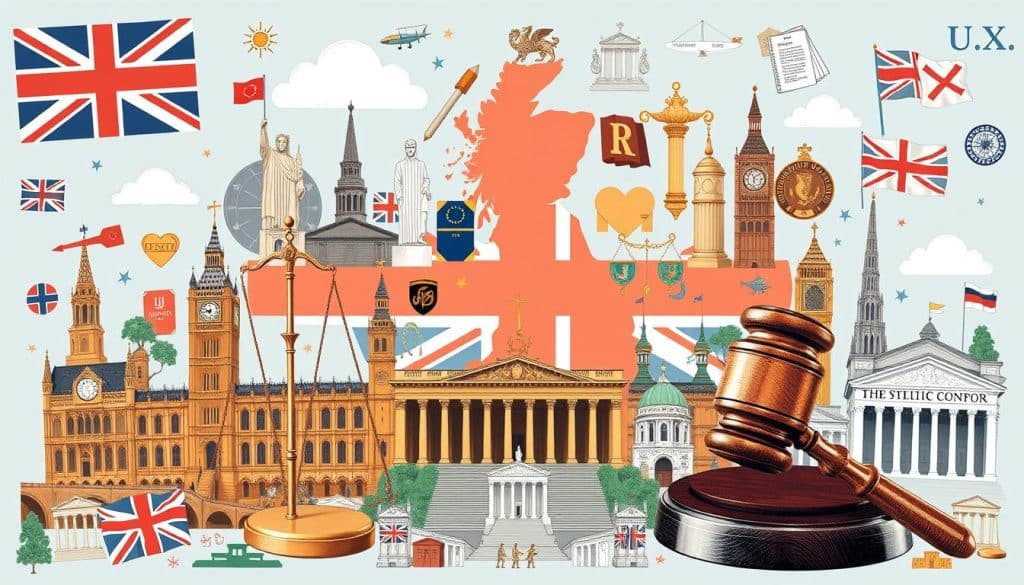In today’s complex economic world, it’s vital for businesses to understand the UK legal framework. Knowing the rules helps them stay on the right side of the law and avoid big risks. The UK’s laws affect many areas, so it’s key for companies to get to know them well.
By tackling these legal issues early on, businesses can build a strong culture of legal awareness. This approach helps them grow and stay stable. It’s all about being proactive and informed.
Key Takeaways
- The UK legal framework is complex and needs a deep understanding.
- Following the rules is crucial to avoid legal problems.
- Business law affects many sectors in the UK.
- Knowing the law helps improve business practices.
- Handling legal and regulatory issues boosts a company’s reputation.
- Keeping up with law changes is important for staying compliant.
An Overview of UK Legal Framework
The UK legal system is unique, blending laws and structures. At its heart, it uses a common law system. This means laws grow from both statutes and court decisions over time. It makes the system flexible and able to react to changes in society.
Laws mainly come from Parliament’s statutes. These include acts and regulations that set clear rules. Alongside statutory law, common law fills in the gaps where laws are silent. It provides a way for judges to guide future cases.
Primary and secondary legislation play key roles in the system. Primary laws are made by Parliament, while secondary laws give other bodies the power to make detailed rules. This structure helps in a clear and effective way to put laws into action.
With devolved powers in Scotland, Wales, and Northern Ireland, the legal system gets even more complex. Each area can make laws on certain topics, leading to different legal systems across the UK. This allows for laws to be tailored to local needs.
Key Regulatory Bodies in the UK
The UK has many important regulatory bodies. They make sure different sectors are well-governed and monitored. These groups are key for following the law and protecting the public. Here are some major regulatory bodies in the UK:
- Financial Conduct Authority (FCA): The FCA looks after financial services. It makes sure consumers are safe and markets are fair.
- Office of Communications (Ofcom): Ofcom checks on the UK’s broadcasting and telecoms. It ensures fair competition and looks after consumer interests.
- Health and Safety Executive (HSE): The HSE makes sure health and safety laws are followed. It works to keep workplaces safe and in line with the law.
- Environment Agency: This agency focuses on protecting the environment. It deals with pollution, waste, and water issues to keep things in check.
It’s important for businesses to know about these regulatory bodies. This knowledge helps them follow UK laws and promote ethical practices in their fields.
Understanding Legal and Regulatory Considerations

In the UK business world, following the law is key. It’s the base for running a business well and building trust with customers and stakeholders. Having a strong plan for following the law helps avoid legal trouble and boosts a company’s image. This is vital for staying ahead in the market.
Importance of Compliance
Setting up compliance steps brings many benefits, such as:
- Risk Mitigation: Companies that focus on following the law cut down on legal issues and fines.
- Enhanced Trust: People are more likely to support businesses that act ethically and follow the law.
- Operational Efficiency: Knowing the laws helps streamline processes and use resources better.
Potential Risks of Non-compliance
Not following the law can lead to big problems, like:
- Financial Penalties: Not following the law can mean big fines that could hurt a business’s money situation.
- Legal Actions: Big law breaches might lead to investigations or lawsuits, causing expensive legal fights.
- Reputational Damage: Bad publicity from not following the law can harm a company’s image, making customers less loyal.
- Operational Disruptions: Companies might have to stop or slow down operations while they fix their legal issues.
Business Regulations in the UK
In the UK, following business rules is key for success. It’s vital to know about licensing and permits as they affect many sectors. Each sector has its own rules that must be followed before starting work, ensuring legal compliance right from the start.
Workplace laws are crucial for a safe and legal work environment. They help businesses avoid legal issues and create a culture of safety and care.
Licensing and Permits
Licences and permits are vital for UK businesses. They are needed across various sectors, like hospitality and healthcare. These include:
- Business licence
- Health and safety permits
- Alcohol licence
- Environmental permits
Having the right licences and permits keeps businesses safe from fines and operation disruptions. Not knowing about these can lead to big legal problems.
Workplace Regulations
Workplace laws focus on employee welfare, insurance, and safety standards. Following these laws is crucial for protecting workers and keeping the workplace productive. Key areas include:
- Employee health and safety measures
- Insurance requirements
- Equality and discrimination policies
- Work hours and conditions
By focusing on workplace laws, businesses stay legal and boost employee morale and productivity. It’s important to know about both licensing and workplace laws for long-term growth.
| Industry | Required Licences/Permits |
|---|---|
| Hospitality | Alcohol Licence, Health and Safety Permits |
| Healthcare | Care Quality Commission Registration |
| Construction | Health and Safety Permits, Environmental Permits |
| Retail | Business Licence, Specific Trading Permits |
Consumer Protection Laws
Consumer protection laws in the UK are crucial for defending consumer rights in various dealings. The Consumer Rights Act 2015 is a major law that gives consumers rights about refunds, repairs, and replacements. These laws ensure fair trading and require businesses to meet certain standards. Knowing these rights helps consumers make better choices and stand up against poor goods or services.
Rights of Consumers
Under the Consumer Rights Act, consumers have many rights to protect them from unfair practices. These include:
- The right to receive goods that are of satisfactory quality.
- The right to expect services to be performed with reasonable care and skill.
- The right to a refund or replacement if goods don’t meet agreed terms.
These rights are key to consumer protection. They let people shop with confidence, knowing they’re protected by law.
Enforcement of Consumer Rights
Enforcement is key to making consumer protection work. Legal steps help consumers defend their rights when needed. Trading Standards and other agencies check on businesses that break the rules. They look into complaints and can take legal steps if necessary.
Consumers can go to these groups for help with disputes and to learn about their rights. This makes the consumer protection system stronger.
Data Protection and Privacy Regulations

For any UK organisation, having good data protection practices is key. Following strict privacy laws is crucial to keep customers’ trust and follow the law. The General Data Protection Regulation (GDPR) lays down important rules for handling data. It gives rights to individuals and sets duties for those who handle data.
Overview of GDPR
The GDPR sets out basic rules for handling personal data. These include:
- Lawfulness, fairness, and transparency: Making sure data processing is clear and open.
- Purpose limitation: Collecting data for real reasons.
- Data minimisation: Only collecting what you need.
- Accuracy: Keeping data correct and current.
- Storage limitation: Keeping personal data only as needed.
- Integrity and confidentiality: Using strong security measures.
Under GDPR, people have big rights over their data. They can ask to see their data, fix mistakes, and erase it. Those who handle data must respect these rights and follow the GDPR rules.
Best Practices for Data Handling
It’s vital to handle data well to follow the law and protect personal info. Important steps include:
- Data retention protocols: Make clear rules on how long to keep data and when to delete it.
- Data breach response strategies: Create a strong plan to deal with data breaches fast.
- Data Protection Impact Assessments (DPIAs): Do DPIAs for high-risk data handling to spot and reduce privacy risks.
Following these steps helps meet privacy laws and builds trust with clients and stakeholders. It shows an organisation cares about protecting data.
| Best Practices | Description |
|---|---|
| Data Retention Protocols | Clearly define and implement policies for data storage duration and disposal procedures. |
| Data Breach Response | Have a comprehensive plan in place to react quickly to data breaches. |
| Data Protection Impact Assessments | Evaluate the impact of data processing activities on privacy rights. |
Employment Law Considerations
It’s vital for UK businesses to know about employment law. This law sets out the rights of employees, making sure they are treated fairly at work. It covers things like discrimination, minimum wage, and how to fairly end employment. Employers must follow these rules to stay legal and create a respectful workplace.
Employee Rights and Responsibilities
Employee rights are about their wellbeing at work. They protect against unfair treatment and ensure fair pay. These rights include:
- Protection against discrimination based on age, gender, race, or disability.
- The right to receive the National Minimum Wage.
- Entitlements regarding maternity and paternity leave.
- Rights relating to redundancy and termination procedures.
Knowing these rights helps businesses build a respectful and legal workplace. Employees also have duties, like following work rules and acting professionally.
Health and Safety Regulations
Health and safety laws are key to keeping employees safe at work. The Health and Safety at Work Act 1974 makes employers responsible for a safe workplace. This means:
- Doing regular risk assessments to spot dangers.
- Setting up safety steps and training staff.
- Having a first aid plan and easy access to medical help.
If employers ignore these laws, they could face big fines and harm their reputation. Putting health and safety first shows a business cares about its workers and follows the law.
| Regulation | Employer Responsibility | Employee Rights |
|---|---|---|
| Discrimination Laws | Ensure non-discriminatory practices | Fair treatment in all employment aspects |
| Minimum Wage | Pay at least the National Minimum Wage | Right to receive agreed wages |
| Health and Safety | Maintain a safe work environment | Right to report unsafe conditions |
Intellectual Property Rights
Intellectual property covers legal rights for mind-made creations like inventions and original works. It’s key for UK businesses to know about these rights. Managing IP rights well protects innovation and keeps brands strong in a tough market.
Types of Intellectual Property
There are several main types of intellectual property, each with its own role:
- Patents: These protect new inventions and processes for a certain time. They give the inventor the right to use their creation alone.
- Trademarks: These keep symbols, logos, or names unique in the market.
- Copyrights: These protect original art, literature, music, and more. They let creators control how their work is used.
- Design Rights: These protect the look of products, like shapes and patterns.
Protecting Your IP in the UK
To keep your intellectual property safe in the UK, follow these steps:
- Do regular IP checks to see what you already own and what needs protection.
- Register trademarks and patents with the Intellectual Property Office (IPO) to get legal rights.
- Use non-disclosure agreements (NDAs) for sharing secret ideas with others.
- Keep up with IP laws and rules to follow them and avoid breaking others’ rights.
Knowing and using intellectual property rights well is key for innovation and staying ahead in today’s fast-paced business world.
Financial Regulations and Compliance

The UK’s financial regulations are complex and crucial. They set the rules for financial services. The Financial Conduct Authority (FCA) is key in making sure these rules are followed. It protects consumers and keeps the market honest, which keeps trust in finance high.
For businesses, following these rules is a must. They need to follow laws to stop illegal activities like money laundering and know who their customers are. These rules help protect businesses and keep the financial markets stable.
- Key Financial Regulations:
- Financial Services and Markets Act 2000 (FSMA)
- Payment Services Regulations 2017
- Capital Requirements Regulation (CRR)
- Importance of Compliance Requirements:
- Preventing financial crime
- Safeguarding customer assets
- Enhancing stability in the financial system
Not following these rules can lead to big fines or damage to a company’s reputation. So, it’s important for all financial services to understand and follow these rules. Doing so ensures they are legal and helps build a trustworthy financial system.
| Regulation | Purpose | Key Requirements |
|---|---|---|
| Anti-Money Laundering (AML) | Prevent money laundering activities | Customer verification, transaction monitoring |
| Know Your Customer (KYC) | Verify customer identity | Document verification, risk assessment |
| Capital Requirements Regulation (CRR) | Ensure financial stability | Maintain capital buffers, liquidity ratios |
Environmental Regulations Affecting Businesses
Businesses in the UK must now deal with complex environmental rules. These rules come from laws like the Environmental Protection Act 1990 and EU laws. They stress the need for companies to follow these rules to be sustainable. Knowing these rules helps a company look good and care for the environment.
Understanding Environmental Policies
Environmental policies set the rules for how companies can lessen their harm to the planet. They cover things like air quality, how to manage waste, and controlling emissions. It’s key for companies to know these rules to follow them and support sustainability.
Steps for Compliance
To follow environmental rules, businesses should:
- Do regular checks to see how they affect the environment and find ways to do better.
- Have strong waste management plans to make sure waste is disposed of correctly and recycled.
- Keep up with law changes to update their policies.
- Train staff on how to be sustainable and follow environmental laws.
- Talk to stakeholders to be open and answer for their environmental actions.
| Environmental Policy Area | Description | Compliance Action |
|---|---|---|
| Air Quality | Rules to keep the air clean and cut down on harmful emissions. | Watch emissions and use air quality testing gear. |
| Waste Management | Rules for how to handle and recycle waste. | Start recycling programs and handle waste the right way. |
| Water Protection | Rules to stop pollution of water from industrial stuff. | Put in systems to manage runoff and check water quality often. |
| Energy Efficiency | Laws to cut down on energy use and make things more efficient. | Use renewable energy and efficient tech. |
By doing these things, companies meet their legal duties and help with sustainability. This has a good effect on the environment and society.
Taxation Regulations in the UK
Understanding UK taxation rules is tough for businesses. It’s key to know these rules well to follow them. Corporate tax and VAT are two main taxes businesses face.
HM Revenue and Customs (HMRC) is in charge of tax laws and making sure everyone follows them. Companies need to register with HMRC to get a taxpayer reference (UTR). This helps them report their income and expenses correctly.
Keeping accurate financial records is a must for tax purposes. Companies should keep detailed books to track what they earn and spend. Checking these records often helps follow tax rules and avoid HMRC penalties.
It’s important to know the taxes UK businesses face. Here’s a quick look at some common taxes:
| Type of Tax | Description | Current Rate |
|---|---|---|
| Corporation Tax | Tax on profits made by companies. | 25% (as of April 2023) |
| Value Added Tax (VAT) | Tax charged on most goods and services. | 20% |
| PAYE (Pay As You Earn) | Tax collected from employees’ wages. | Based on income level |
| National Insurance Contributions | Contributions to social security. | Based on earnings |
Staying up to date with tax rules helps businesses follow the law and plan their finances well. Getting advice from tax experts or consultants can be very helpful in understanding UK taxes.
Cross-Border Trade Considerations
After Brexit, cross-border trade has changed a lot. It now brings both challenges and chances for UK businesses. New trade deals have changed how companies work with markets inside and outside the European Union. It’s crucial for businesses to understand these changes to trade internationally well.
Customs rules and tariffs from Brexit affect cross-border trade a lot. They change how goods move and their cost. UK businesses need to adjust to these changes to keep their supply chains running smoothly. They must know the trade deals well and use them to their benefit in global markets.
New tariffs and customs rules can be tough to handle. But, businesses that get advice and improve their trade plans can gain a lot. By keeping up with changes and being flexible, UK companies can handle the risks of cross-border trade. They can also make the most of the new rules to improve their global operations.
















